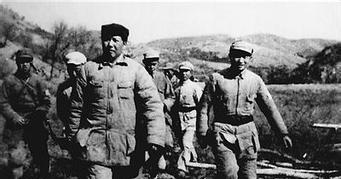In July 1938, the Japanese automobile team was going to pass through the outskirts of Nanjing, and Wang Bicheng thought it was a good opportunity to start
Text/No Counting Reading History
A small detail can often tell whether a commander is good or not, because the battlefield and war are themselves rapidly changing.
If small details can be grasped, then such a commander is excellent, and for the enemy, it will be terrible.

1
start
Wang Bicheng is a tiger general and an old revolutionary.
In 1938, Wang Bicheng led the soldiers of the New Fourth Army to open up the anti-Japanese base area in southern Jiangsu, and at that time, the nightmare of the Japanese army near the base area began.
Although the firepower of the New Fourth Army was not as strong as that of the Japanese army, Wang Bicheng used guerrilla warfare to the extreme, making the Japanese army suffer enough.
What we are going to talk about today is the battle that took place on the outskirts of Nanjing, the ambush battle against the Japanese army commanded by Wang Bicheng.
2
ambush
For the troops that ambushed the Japanese army, Wang Bicheng's favorite was to fight the Japanese transport team.
The japanese army's transport team is not strong in combat, the key is that as long as a battle is fought, the materials of the New Fourth Army will not need Wang Bicheng to worry about, and the most important thing is that they can also harvest a lot of good guns.
One day in July 1938, Wang Bicheng received the news that the Japanese car fleet was about to pass through the suburbs of Nanjing, which was a good time for Wang Bicheng to start.
Wang Bicheng quickly assembled the guard and asked the guard to accompany him to survey the terrain.
Looking at it, Wang Bicheng felt that the location of Xintang Town was very suitable for ambush.
So, the troops of the New Fourth Army began to assemble, ready to fight a beautiful battle.
Under Wang Bicheng's arrangement, the warriors began to set off after eating, and soon came to the road near Xintang Town.
The general ambush battle is to place the troops in the direction of the vicinity, and Wang Bicheng also did the same.
On July 28, the Japanese car team finally arrived, and the sound of cars was already heard from afar.
Wang Bicheng had already planted mines with the soldiers, and in the distance, he finally saw the Japanese cars.
Japanese cars approached and soon entered the ambush position of the New Fourth Army.
Suddenly, there was a loud bang, the mines exploded, and the car could not move.
The Japanese soldiers began to get off the car one after another, and Wang Bicheng shouted: "Fire! ”
Bullets from both directions began to roar at the Japanese soldiers, and as soon as they were seen, the Japanese soldiers fell down a lot.
But the Japanese troops also quickly pulled out a defensive line and began to fight back by car.
Wang Bicheng began to ask the soldiers of the New Fourth Army to throw grenades, some of which fell under the car, and the shrapnel stuck into the legs and feet of the Japanese soldiers.
After the battle lasted half an hour, the Japanese troops had suffered many casualties, and even two cars had been blown up.
Suddenly, Wang Bicheng's ears shook, and he clearly heard the roar of the plane.
3
Fall back
The arrival of the plane indicates that the Japanese troops have noticed the place.
Wang Bicheng secretly said that it was not good in his heart, and he immediately ordered: All the troops began to retreat!
Many of the soldiers were still in a daze, and the battle had only started for half an hour before they had to retreat.
The soldiers breathed a sigh of relief as the Japanese planes swooped over their heads.
But it wasn't just planes, tanks, planes, Japanese reinforcements that had arrived. It just so happened that Wang Bicheng intuitively and accurately let the troops retreat, otherwise they might have been wrapped in dumplings.
In this battle, the New Fourth Army did not sacrifice a single person!
Resources:
"The Founding General", "Wang Bicheng", "The Great Reference of China's War of Resistance Against Japanese Aggression"